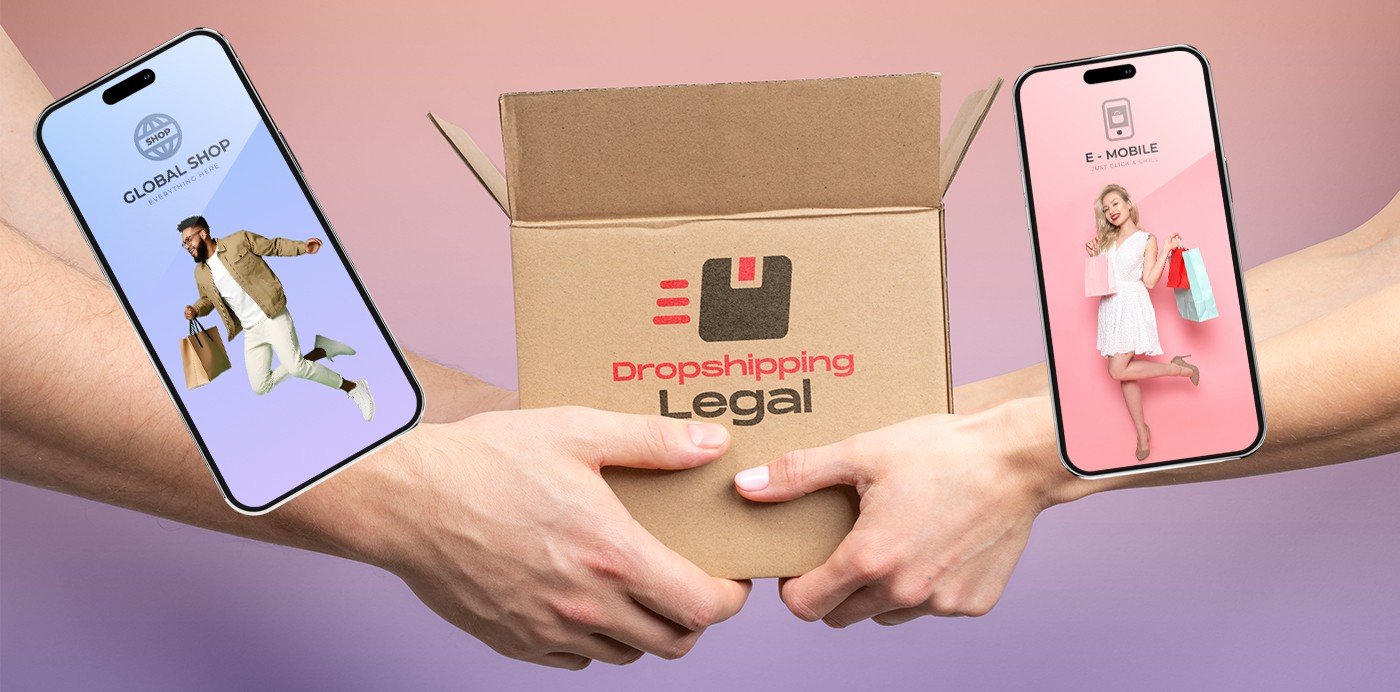DISCLAIMER: This article has been provided to offer information only. This is not legal advice – please be sure to receive due legal advice if you wish to know more about dropshipping and its legality.
eCommerce has been the centre of attention ever since the internet took off and became a vital component of daily life. eCommerce is a cornerstone of modern civilisation, so much so that it is impossible to exist without it. One major advantage is that you can order products online and have them delivered right to your house instead of having to drag yourself into stores. But running an eCommerce business is not simple.
There are numerous inherent dangers, ranging from overinvesting in a stock that never sells to not being visible enough as a result of marketing. One of the main problems is stock. A lot of eCommerce businesses fail because they overinvest in unpopular goods. They are thus left with goods they have already paid for but are unable to sell. Dropshipping is, of course, an alternative.eCommerce businesses that use dropshipping, on the other hand, advertise that they have inventory accessible. They are regarded as a typical seller, but with one important distinction. The eCommerce store places an order with their wholesale supplier for the product when a customer purchases it. The item is then shipped by that provider. Because platforms do not need to invest in volume, this inevitably translates into lower risk. Instead of taking a chance, it allows eCommerce companies to know what is hot and selling.
Dropshipping has gained a lot of traction and is thought to be the best option for entrepreneurs and individuals lacking storage space. But in recent years, questions about its morality, efficacy, and even legality have surfaced. Is Dropshipping Legal? Let’s look at the details of this widely used eCommerce platform.
Why Is Dropshipping Such a Big Thing?
As previously mentioned, dropshipping’s low overhead has made it the preferred eCommerce strategy for a lot of people nowadays. In the past, launching a business required large cash investments from companies. This would go towards product storage, promotion, and the creation of eCommerce systems via websites or suppliers like Amazon and eBay. Since there would be a huge demand, the stock would need to be purchased in bulk. But there’s a chance that issues will arise if that requirement is not met.
Dropshipping eliminates the requirement for such high overhead. The eCommerce platform can offer more products and requires no storage. The seller makes arrangements for the product to be delivered to the customer when they place an order. The dropshipping business then puts in place a delivery strategy to guarantee that the goods get delivered as quickly as possible.
People who use dropshipping can be more ambitious because it frees them from having to maintain overhead or store items. To make sure they are more visible, businesses might spend more money on marketing. They are also able to provide a wider variety of goods. Therefore, dropshipping gives people the opportunity to experiment with eCommerce without requiring them to assume quite as much risk as they did previously.
Dropshipping: Is It Legal?
But as you may have noticed, dropshipping has grown to be a divisive topic. Some people think it’s unethical to merely act as a middleman for a wholesale dealer and sell goods that you do not own. Businesses that use dropshipping frequently fail to disclose this fact. They frequently use different strategies to hide the fact that they do not have the item in their warehouse, which causes the delivery of the stock to be delayed. If there are issues, disagreements with customers may result.
On the other hand, there are worries that dropshipping may not even be a legitimate business. Although these worries may have merit, dropshipping is not illegal for businesses to use. It’s a widespread practice, and as long as the regulations are observed, a business can use dropshipping to fulfil orders placed online without facing any legal repercussions. The problem, though, lies in the product a business is selling: does it adhere to local, state, federal, and international regulations?
For instance, a business may find itself in trouble if it is discovered to be selling fake goods. There may be an issue if a product violates any national, regional, or international regulations pertaining to the sale of particular goods. That being said, this is a product-specific problem rather than a dropshipping issue. It is noteworthy that dropshipping is completely lawful in and of itself.
Which laws concern dropshipping?
Failure on the part of a dropshipping company to consider all possible scenarios could result in the opening of numerous legal landmines. Of course, one of the most frequent hazards in this industry is copyright legislation. Dropshipping goods that turn out to be fake or violate copyright rules could land you in legal trouble if you continue to sell them. Prior to anything else, confirm that your partner is offering authentic products. This can prevent possible issues with trading standards and prevent this problem from becoming a reality.
Advertising is another prevalent issue. You might be charged with deceptive advertising if your product is marketed as offering a service or solution that it does not. Make sure to test any goods you plan to dropship in order to verify that your marketing promises are accurate.
In addition, your business may be held accountable for marketing defective or subpar goods. It is your duty to provide your clients with high-quality, safe items. You are not legally responsible for the product’s sale because you did not make it. For added peace of mind, make sure your company is covered by product liability insurance.
Taxes are another point of contention. Many dropshipping businesses run the run the risk getting into trouble with the tax authorities. As a shop, keep in mind that you are still subject to tax rules even if you offer a special delivery option. In order to pay sales and income tax, make sure you have the necessary licenses and permits and that you take the time to carefully record your transactions.
These are usually the primary legal domains in which a dropshipping company may encounter difficulties. You should be able to stay out of trouble with the law if you concentrate on these.
Legal Repercussions for Dropshipping
Dropshipping is permissible, but it depends on the product supplier being a reputable person who offers secure goods. Legal consequences for marketing dangerous products could arise if anything goes wrong with the device, like injuring someone. This is where dropshipping’s legality can emerge as a significant topic of discussion. Who bears accountability, for instance, in such a scenario?
Any company that uses dropshipping has to think about retaining legal counsel to review any contracts that your partners may give. You should, if necessary, have a lawyer prepare new agreements so that you have some additional legal protection. But a lot of dropshipping companies include legal responsibility agreements that guarantee you will be held accountable in case something goes wrong.
Be sure to address all of these issues before you even think about listing their products for sale online. Legal compliance has grown in significance within the dropshipping sector. Verify that the supplier you choose accepts legal liability in the event that the product or products they offer to customers injure or damage them. If that assurance isn’t given to you, there should be a warning indication that the product might not be safe at all.
Choosing Wisely: Is Dropshipping Right for You?
As you can see, dropshipping’s legality is not the problem; rather, quality is. Even though you do need to consider the aforementioned legal issues, managing a corporation with more conventional supply sources is the same. As a result, you don’t need to worry too much about dropshipping being legal because it’s completely legal to receive goods and deliver them in this way.
Ensuring that things are legal to sell in the first place ought to be your top priority. Do they have legal status? Do they violate any laws, regulations, or standards of trade? Is it safe to use the products? Do they carry out their stated intentions?
Never make assumptions based only on a dropshipping partner’s pitch. Purchase the product, give it a try, and determine whether it lives up to your expectations. Dropshipping is permissible; however, it can be harmful to offer hazardous goods or things that don’t live up to the description. Examine this carefully, and as usual, think about getting legal counsel from a specialist. Seek the advice of a commerce lawyer.
It’s crucial to have everything set up before working with a dropshipping partner to generate sales. The more safeguards and risk-avoidance measures you can implement, the better. If you follow the advice above, though, you ought to be in a much better position to engage in dropshipping without assuming any of the associated dangers.




 E-Commerce Setup
E-Commerce Setup

